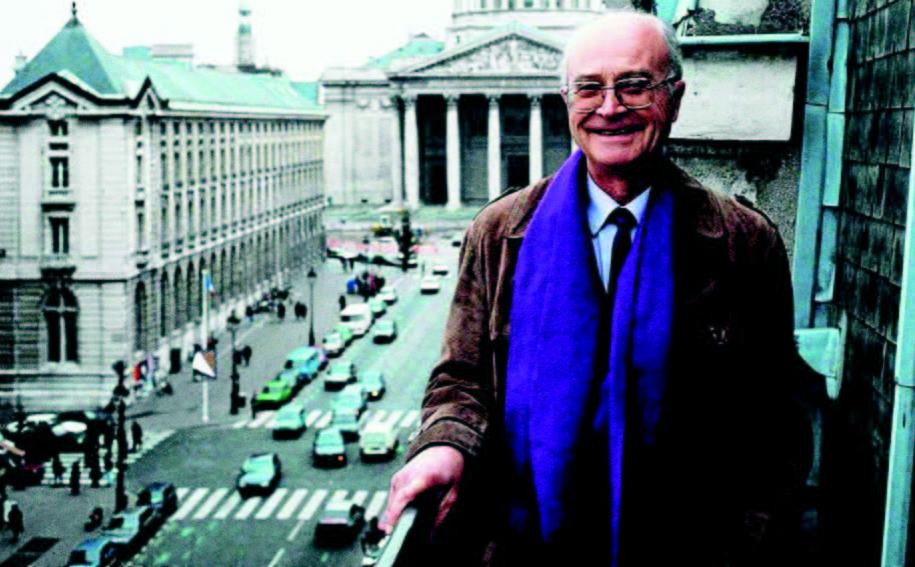
Gilles G. Granger (1920-2016)
Gilles-Gaston Granger (January 28, 1920- August 24, 2016) was a French philosopher who contributed to philosophy of social sciences, philosophy of logic and mathematics, and history of philosophy, writing on philosophers such as Aristotle, Condorcet, Bolzano, and Wittgenstein. Interested in the variety of methods underlying scientific reasoning, he created in 1964, developed and directed until 1986 the Center for Comparative Epistemology at the University of Aix-en Provence. Elected in 1986 at College de France with a chair of the same name, he has left a substantial bibliography including nineteen books and one hundred and fifty articles. His work has been translated in nine languages.Gaston Granger was born and grew up in Paris. His father was a carpenter. His mother and younger sister both died from tuberculosis when he was still a toddler. Given his excellent results in primary school, he was encouraged to become a school teacher, a cursus which, at the time, did not require a baccalaureate. One of his father's clients, however, himself a Professor, understood that the young man had exceptional intellectual talents. Thanks to his help, young Granger was admitted to Lycée Henri IV, and became in 1940 a student in the prestigious Ecole Normale Supérieure. He passionately attended Jean Cavaillès' seminar until the latter was arrested as a resistant in August 1942. Cavaillès' work on the Philosophy of Mathematics may have motivated him and his classmate Jules Vuillemin to study mathematics. Along with other ENS students who opposed force labour in Germany, however, he had to leave ENS to join a Resistance group in Creuse in 1943. After the war, he kept his resistant code name of Gilles.He was nominated in 1947 Professor of Philosophy at the University of São Paulo, where he taught and published articles in Portuguese. Nominated in the University of Rennes (France) in 1955, he defended a State Doctoral thesis comprising two books about Economic Methodology and the Social Mathematics of Condorcet. On line with these works, his next major opus, Formal Thought and the Sciences of Man (1960), deals with the mathematical models that contribute to formalization in the human sciences. It is based on the transcendental claim that mathematics have an a priori role in producing scientific knowledge. Scientific objectification is seen as a symbolic process through which what Grangerwill later call "formal contents" are generated. Scrutinized from the viewpoint of science in the making, the computational properties of the languages of science across fields of inquiry (linguistics, economics, psychology) are emphasized as reflecting specific rational practices of interest to the philosopher of science.After two years spent in Congo as a Director of the Ecole Normale Supérieure of Central Africa, he was nominated Professor at the University of Aix-en Provence in 1964. Within a few years, he managed to set up an active research group. As a "Center for Comparative Epistemology", it specialized in the study of the modes of knowledge production across scientific fields, with a strong emphasis on the philosophy of mathematics and logic. With its research seminar and his library, this CNRS-funded unit would soon attract students and researchers from around the world, in particular from Canada, where Granger has been a regular guest speaker and invited Professor. A major event organized in 1969 by the Center was the Conference entitled "Wittgenstein and the problem of the philosophy of science". That same year, Granger published a book on Wittgenstein, followed, much later, by a translation of Wittgenstein's Tractatus Logico-Philosophicus.Granger's Essay on the Philosophy of Style, published in 1968, highlights stylistic variations in the formal analysis of magnitude, geometry, vectors, linguistic, and action theory. These variations are seen as the proper object of philosophy, whose goal is to interpret individual ways of construing the relation between form and content. Philosophical knowledge is now seen as intimately linked to the exploration of stylistic comparisons between scientific modelizations. Pour une Connaissance Philosophique, published in 1988, develops further the concept of philosophical knowledge as an interpretive endeavour, focussing on the stylistic variations and their specific types of formal contents.From 1986 to 1990, Granger held the chair of Comparative Epistemology at College de France. He authored no less that eight more books after his retirement. Gilles Granger was Doctor Honoris Causa of the Universities of São Paulo, (Brazil) and Sherbrook (Canada). He has exerted a deep influence on his students and colleagues. Two books have been devoted to his work. Publications• Lógica e filosofia das ciências, São Paulo: Editora Melhoramentos, 1955.• La Raison, Paris, Presses Universitaires de France, 1955, 1984.• Méthodologie économique, Paris: Presses Universitaires de France, 1955.• La mathématique sociale du Marquis de Condorcet, Paris, Presses Universitaires de France, 1956, Paris: Odile Jacob, 1989.• Pensée formelle et sciences de l'homme, Paris, Aubier-Montaigne, 1960, augmented edition: 1967, Paris: Archives Karéline, 2010.• Wittgenstein, Paris: Seghers, 1969.• Essai d'une philosophie du style, Paris: Armand Colin, 1969, Paris: Odile Jacob, 1987.• La Théorie aristotélicienne de la science, Paris: Aubier, 1976.• Langages et épistémologie, Paris, Klincksieck, 1979.• Leçon inaugurale, Paris: Collège de France, 1987.• Pour la connaissance philosophique, Paris: Odile Jacob, 1988.• Invitation à la lecture de Wittgenstein, Aix-en-Provence: Alinéa, 1990.• La Vérification, Paris: Odile Jacob, 1992.• La Science et les sciences, Paris: Presses Universitaires de France, coll. "Que sais-je ?", 1993.• Formes, opérations, objets, Paris: Vrin, 1994.• Le probable, le possible et le virtuel, Paris: Odile Jacob, 1995.• L'irrationnel, Paris: Odile Jacob, 1998.• La pensée de l'espace, Paris: Odile Jacob, 1999.• Sciences et réalité, Paris: Odile Jacob, 2001.• Philosophie langage science, Paris: EDP Sciences, 2003. Translations• Wittgenstein, L. Carnets 1914-1916. Paris: Gallimard, 1971.• Wittgenstein, L. Tractatus Logico-Philosophicus. Paris: Gallimard, 1972. Collective Books on Gilles-Gaston Granger's Philosophy:• La Connaissance Philosophique. Essais sur la philosophie de Gilles Gaston Granger. Joëlle Proust & Elisabeth Schwartz (eds.), Paris: Presses Universitaires de France, 1995.• La pensée de Gilles-Gaston Granger, (Antonia Soulez, ed.), Paris: Hermann, 2010. (by Joëlle Proust).